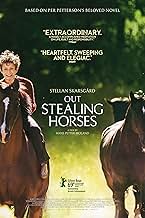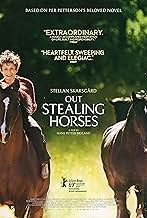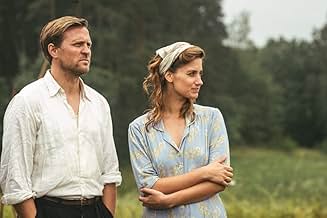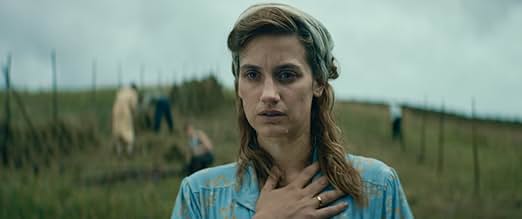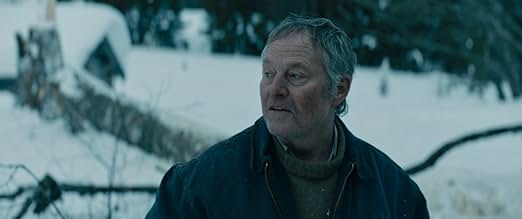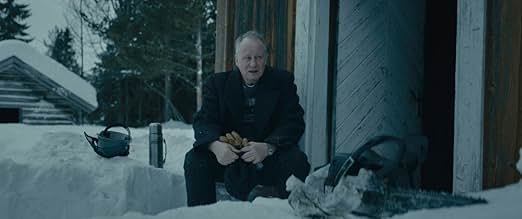VALUTAZIONE IMDb
6,5/10
3492
LA TUA VALUTAZIONE
Aggiungi una trama nella tua linguaA grieving widower moves to the country where a chance encounter rekindles memories from his past.A grieving widower moves to the country where a chance encounter rekindles memories from his past.A grieving widower moves to the country where a chance encounter rekindles memories from his past.
- Regia
- Sceneggiatura
- Star
- Premi
- 7 vittorie e 11 candidature totali
Tone Beate Mostraum
- Tronds mor
- (as Beate Mostraum)
Anders Baasmo
- Olav
- (as Anders Baasmo Christiansen)
Recensioni in evidenza
I did not have expectations to the movie, as I started reading the book once, and put it down after reading not too long, finding it not to my taste. It seems I should have continued reading. The movie is in any case rare in story and filming. Soft, thrilling, surprising, intriguing worth watching. A beautiful movie to watch. Reminds me of movies like the cider house rules, the emigrants (innvandrarna/utvandrarna) and Pelle Erobreren.
Watching movies at a festival has disadvantages. The second movie (or the next ones!) seen on the same day may catch you as a more tired spectator, or under the impression of the previous movie, or confused by the alternation of styles and genres. This is, perhaps, what happened to me watching the Norwegian director Hans Petter Moland's film 'Ut og stjæle hester' (or 'Out Stealing Horses'), a psychological drama with references to the relatively recent history, interestingly constructed, and benefiting from the participation of an excellent team of actors. And yet, although I really liked one of Moland's previous films ('In Order of Disappearance'), I was a little stuck watching this movie. The fault may be mine, but not only mine.
The story takes place in 1999, on the threshold of the millennium, that period exactly 20 years ago, when the entire planet was preparing for parties and was obsessed with the millennium bug. The main hero (the excellent Stellan Skarsgård) seems to be trying to run away from the world after he his wife had died in a traffic accident, buying a house in a village far from the turmoil of the world. It is precisely here that the past reaches him through the accidental encounter of a forgotten friend from adolescence. The film reconstructs through interleaved flashbacks the decisive summer of his coming to age, in the years immediately following the war that had left traces in people's souls and in the relationships between them. We progress in the remembrance of the past together with the old man. But how much of memory can be trusted after a lifetime has passed? Was the reality then known, understood, and especially as does it matter today?
The questions are interesting, but one of the problems of the film is that the scriptwriter (also Moland adapting a novel) and the director try to give them a little too explicit answer, along the lines of Buddhist philosophy. Another problem is the lack of dynamism in the evolution of the characters. The film is beautifully filmed and played brilliantly (by Skarsgård, but also by the young actor who plays him as a teenager, and by the whole team), and yet 'Out Stealing Horses' failed to captivate me, introduce me to the story, involve me. The distance between me and Scandinavia, its history, its people and problems, has not been completely eliminated in this film.
The story takes place in 1999, on the threshold of the millennium, that period exactly 20 years ago, when the entire planet was preparing for parties and was obsessed with the millennium bug. The main hero (the excellent Stellan Skarsgård) seems to be trying to run away from the world after he his wife had died in a traffic accident, buying a house in a village far from the turmoil of the world. It is precisely here that the past reaches him through the accidental encounter of a forgotten friend from adolescence. The film reconstructs through interleaved flashbacks the decisive summer of his coming to age, in the years immediately following the war that had left traces in people's souls and in the relationships between them. We progress in the remembrance of the past together with the old man. But how much of memory can be trusted after a lifetime has passed? Was the reality then known, understood, and especially as does it matter today?
The questions are interesting, but one of the problems of the film is that the scriptwriter (also Moland adapting a novel) and the director try to give them a little too explicit answer, along the lines of Buddhist philosophy. Another problem is the lack of dynamism in the evolution of the characters. The film is beautifully filmed and played brilliantly (by Skarsgård, but also by the young actor who plays him as a teenager, and by the whole team), and yet 'Out Stealing Horses' failed to captivate me, introduce me to the story, involve me. The distance between me and Scandinavia, its history, its people and problems, has not been completely eliminated in this film.
Saw this at the Berlinale 2019, where it was part of the official Competition for the golden bear. While not winning the 1st Prize, the jury awarded a Silver Bear for Outstanding Artistic Contribution, for Rasmus Videbæk who was responsible for the cinematography. Be that as it may, however, the movie failed to interest me in the protagonists and their behavior. Shots of landscapes, rivers, nature and (of course, given the title) the horses were more interesting than what the actors said and did. So, it could have been a nice watch but that is never my prime reason to see a movie.
In particular, the frequent switching between 1999 and 1948 annoyed me several times. It broke the logic flow in the story line. Luckily, it was clear with every flash back/forward in which time frame we were, due to other actors playing the younger variants. For me it remained unclear from start to finish what it was that the protagonists did tick, and why they did what they did. I cannot imagine that the fatal Cain/Abel scene, where a young boy inadvertently shot his brother, can have such a long term bearing on everyone actions, but what do I know??
Maybe the underlying book is better in explaining the psychology driving these people's actions, but I missed it dearly here. It is even very well possible that the Cain/Abel scene was not so important after all, but that it was the woman he had eyes on but who was in fact courted by his father. I wonder, due to suggestions in that direction in the announcement on the Berlinale website, but I can recall only a single scene from memory to more or less confirm this plot element.
All in all, despite the visual elements to make it a nice watch, I failed to get interested in the story or the psychology of the protagonists. I see hints in various reviews that there is more substance than I could derive from it. Such things can happen during a festival where one sees three of four movies per day.
In particular, the frequent switching between 1999 and 1948 annoyed me several times. It broke the logic flow in the story line. Luckily, it was clear with every flash back/forward in which time frame we were, due to other actors playing the younger variants. For me it remained unclear from start to finish what it was that the protagonists did tick, and why they did what they did. I cannot imagine that the fatal Cain/Abel scene, where a young boy inadvertently shot his brother, can have such a long term bearing on everyone actions, but what do I know??
Maybe the underlying book is better in explaining the psychology driving these people's actions, but I missed it dearly here. It is even very well possible that the Cain/Abel scene was not so important after all, but that it was the woman he had eyes on but who was in fact courted by his father. I wonder, due to suggestions in that direction in the announcement on the Berlinale website, but I can recall only a single scene from memory to more or less confirm this plot element.
All in all, despite the visual elements to make it a nice watch, I failed to get interested in the story or the psychology of the protagonists. I see hints in various reviews that there is more substance than I could derive from it. Such things can happen during a festival where one sees three of four movies per day.
7OJT
Out stealing horses (Ut å stjæle hester) is a very careful adaption of the very successful novel with the same name by Norwegian author Per Petterson, a novel which have solid millions in at least 50 languages. The film won the silver bear in The Berlin International film Festival.
Let this be said up front: if you're not up to watching a slow storytelling, and not able to sense the small and careful waves of air, glimmers of sun and the wet sensation of rain woven into the nostalgia here, this film will not be for you. You need to be completely at ease when watching, otherwise the film will feel very slow.
Hans Petter Moland has made a film true to the poetic and nostalgic tone of the book, which tells the story about a newly pensioned man, in grieve after the loss of his wife, moving out in the remote countryside, not too far from where he have had childhood memories. The he randomly meets a neighbor which he realizes he must have known some 50 years back. This brings back a lot of forgotten memories from the past. Memories of fondness and great tragedy.
The film is slo and thoughtful, with a stark nostalgic thread, but also a tiny fracture of humor. The film is very sensible, with a lot of thoughts put into photography, with pictures of grass and wind. The film is narrated by the mans telling voice, which in this case adds to the feeling of storytelling. A work of art of a film!
Let this be said up front: if you're not up to watching a slow storytelling, and not able to sense the small and careful waves of air, glimmers of sun and the wet sensation of rain woven into the nostalgia here, this film will not be for you. You need to be completely at ease when watching, otherwise the film will feel very slow.
Hans Petter Moland has made a film true to the poetic and nostalgic tone of the book, which tells the story about a newly pensioned man, in grieve after the loss of his wife, moving out in the remote countryside, not too far from where he have had childhood memories. The he randomly meets a neighbor which he realizes he must have known some 50 years back. This brings back a lot of forgotten memories from the past. Memories of fondness and great tragedy.
The film is slo and thoughtful, with a stark nostalgic thread, but also a tiny fracture of humor. The film is very sensible, with a lot of thoughts put into photography, with pictures of grass and wind. The film is narrated by the mans telling voice, which in this case adds to the feeling of storytelling. A work of art of a film!
What a amazing talent of working ,beautiful piece of work a unrest soul coming out from Director.
Very deep soulful and strong acting.Very emotional movie.
Lo sapevi?
- QuizTobias Santelmann, Pål Sverre Hagen and Anders Baasmo previously worked together on Kon-Tiki (2012), as Knut Haugland, Thor Heyerdahl, and Herman Watzinger respectively.
- Colonne sonoreVindhester
Composed by Kåre Vestrheim
I più visti
Accedi per valutare e creare un elenco di titoli salvati per ottenere consigli personalizzati
- How long is Out Stealing Horses?Powered by Alexa
Dettagli
- Data di uscita
- Paesi di origine
- Sito ufficiale
- Lingue
- Celebre anche come
- Out Stealing Horses
- Luoghi delle riprese
- Aziende produttrici
- Vedi altri crediti dell’azienda su IMDbPro
Botteghino
- Budget
- 4.100.000 € (previsto)
- Lordo in tutto il mondo
- 1.480.790 USD
- Tempo di esecuzione2 ore 3 minuti
- Colore
- Proporzioni
- 2.35 : 1
Contribuisci a questa pagina
Suggerisci una modifica o aggiungi i contenuti mancanti



